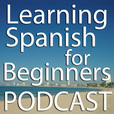
Summary: <br> This is Podcast 10, you can listen to it using the player shown above these lines.<br> In this audio lesson we will practice 5 Important Verbs in Spanish.<br> You can find the transcript of this lesson in the following lines:<br> <br> Downloadable PDF Transcript: Download here<br> <br> Podcast Transcript (Text Version):<br> <br> Hi, welcome to Learning Spanish for Beginners, the place to learn Mexico’s conversational Spanish.<br> <br> Today we will practice five important verbs in Spanish.<br> <br> <br> Let's begin with a few examples of the verb “ser”, which means “to be”, and it is used to talk about permanent or essential characteristics of something.<br> <br> Let's look at the examples, feel free to repeat after each sentence.<br> <br> I am a man – Yo soy un hombre<br> I am a woman – Yo soy una mujer<br> I am Mexican – Yo soy mexicano<br> I am American – Yo soy americano<br> I am intelligent – Yo soy inteligente<br> You are interesting – Tú eres interesante<br> You are pretty – Tú eres bonita<br> He is tall – Él es alto<br> He is thin – Él es delgado<br> She is independent – Ella es independiente<br> <br> <br> Now, let's look at the verb “estar”. It also means “to be” but it is used to talk about temporary or nonessential characteristics of something.<br> <br> Let's look at a few examples, feel free to repeat after each sentence.<br> <br> I am tired – Yo estoy cansado<br> I am happy – Yo estoy contento<br> I am angry – Yo estoy enojado<br> I am at school – Yo estoy en la escuela<br> I am in France – Yo estoy en Francia<br> I am thinking – Yo estoy pensando<br> You are at the office – Tú estás en la oficina<br> You are at work – Tú estás en el trabajo<br> He is with his friend – Él está con su amigo<br> She is at church – Ella está en la iglesia<br> <br> <br> Next, we will take a look at “tener”, a verb that means “to have” in the sense of owning or possessing something.<br> <br> Now, let's look at a few examples. Feel free to repeat after each sentence.<br> <br> I have a pencil – Yo tengo un lápiz<br> I have a notebook – Yo tengo un cuaderno<br> I have good friends – Yo tengo buenos amigos<br> I have a dog – Yo tengo un perro<br> I have money – Yo tengo dinero<br> You have a bicycle – Yo tengo una bicicleta<br> You have a shirt – Yo tengo una camisa<br> He has problems – Él tiene problemas<br> She has to solutions – Ella tiene soluciones<br> She has jewels – Ella tiene joyas<br> <br> <br> The next verb is “haber”, which also means “to have”. It is often used as an auxiliary, also to say “there is” or “there are”, and sometimes to express the need to do something.<br> <br> Let's look at a few examples:<br> <br> I have met the president – Yo he conocido al presidente<br> I have traveled a lot – Yo he viajado mucho<br> I have decided to go to the movies – Yo he decidido ir al cine<br> I have talked to her – Yo he hablado con ella<br> I have seen the movie – Yo he visto la película<br> You have found the keys – Tú has encontrado las llaves<br> He has eaten a lot – Él ha comido mucho<br> She has slept three hours – Ella ha dormido tres horas<br> There is a need to clean the car – Hay que limpiar el carro<br> There are two bicycles in the backyard – Hay dos bicicletas al patio<br> <br> <br> The last verb of today is “querer”, a verb that means “to want”.<br> <br> Let's review a few examples, feel free to repeat after each sentence.<br> <br> I want water – Yo quiero agua<br> I want food – Yo quiero comida<br> I want to go to dinner – Yo quiero ir a cenar<br> I want to walk in the park – Yo quiero caminar en el parque<br> I want to be there – Yo quiero estar ahí<br> You want more money – Tú quieres más dinero<br>
